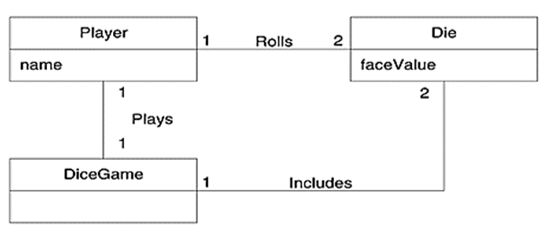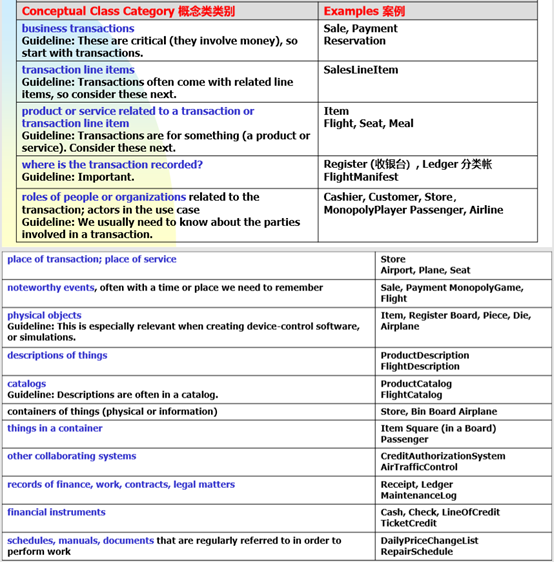3.2 面向对象分析(一)名词法
Analysis Phase分析阶段
在软件工程,分析是一种过程,把用户需求转变为系统需求
系统规格说明,也称为逻辑结构,是开发人员眼中的系统
已经有了哪些业务规则、业务逻辑?
还有哪些事需要提醒客户的?
大的、复杂系统的开发,有两种主要的分析方法
面向功能的分析Function-oriented analysis
concentrating on the decomposition of complex functions to simply ones.
面向对象分析Object-oriented analysis
identifying objects and the relationship between objects.
在抽象层面,面向功能的分析法用得多一点
把系统分成模块
在模块层面,面向对象分析法用得多一点
模块的功能如何实现?--- OOAD技术!
从“用户的角度”到“开发人员的角度”之间的差异

Object Oriented Analysis 面向对象分析主要步骤
Identifying objects 识别对象
Organising the objects: 组织对象
classifying the objects identified, so similar objects can later be defined in the same class.
Identifying relationships between objects: 定义对象之间的关系
this helps to determine inputs and outputs of an object.
Defining operations of the objects: 定义对象的操作
the way of processing data within an object.
Also known as ‘responsibility assignment’
这一步,主要在设计阶段完成
Defining objects internally: 定义对象内部细节
information held within the objects.
Three ways to do Object Oriented Analysis (there are more…)
1)Conceptual model (Larman) 概念模型,又称“名词法”
Produce a “light” class diagram
2)Analysis model with stereotypes (Jacobson) 分析模型
Boundaries, entities, control.
3)CRC cards (Beck, Cunningham) CRC法,类/职责/协作
Index cards and role playing.
A good analyst knows more than one strategy and even may mix strategies in order to identify the objects and relationships for the design phase.
一个好的分析师掌握多种技术,知道如何混合使用各种技术。目标只有一个: 发现对象、定义对象之间的关系。
概念模型
概念模型 conceptual model 表示了问题领域的的 “概念”及其关系,也称 为领域模型 ‘domain model’
UML图形表示为 “没有定义操作的类图”
它能够显示:概念 Concepts、概念之间的关系 Associations of concepts、概念的属性 Attributes of concepts

名词法定义概念类
名词法定义概念(conceptual class)
重用或者修改已有的模型 Reuse or modify existing models.
This is the first, best, and usually easiest approach
借助行业、公司内部法的“概念类列表 ” Concept Category List
在需求描述中查寻名词(短语)Finding Concepts with Noun Phrase Identification.
复习: 面向对象分析与结构化分析方法之间的最大差异是 A central distinction between object oriented and structures analysis:
前者根据对象划分系统,而后者根据功能 division by concepts (objects) rather than division by functions.
概念类列表 The Concept Category List Table

Finding Concepts with Noun Phrase Identification 名词短语法
方法
在问题领域的文本描述中,标识出名词、名词短语,把它们作为候选的概念类或者属性 Identify the noun and noun phrases in textual descriptions of a problem domain and consider them as candidate concepts or attributes
对发现的名称(短语)进行分析,辨别是合适的概念类吗?概念可以合并吗?等等
定义概念类之间的关系
定义概念类的属性
注意
不能机械地转换“名称 ----> 概念类”
自然语言描述的文字有歧义、重复、一词多意、一意多词等,要仔细分析
比如英语,复数一般就不需要了,students\student, 只要student即可
小结
领域(用户的角度)、系统(开发人员的角度)
概念模型 == 领域模型 概念类 == 领域概念
如何寻找、定义领域内的概念类?
方法一:名称法
利用已有
查找概念类列表
从问题描述中寻找名词、名词短语,进行分析
方法二:分析模型法
方法三:CRC法




